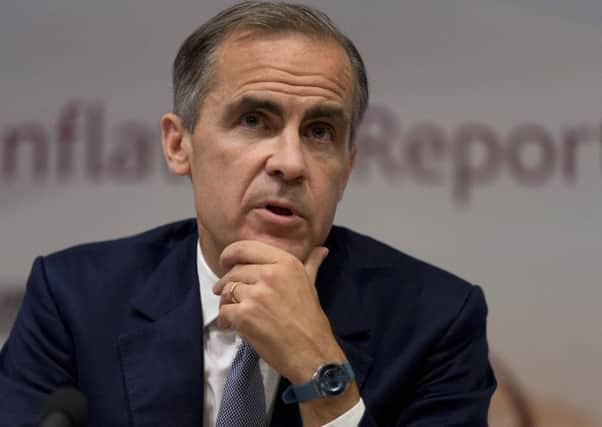Jeff Salway: Few winners as Bank cuts interest rate


Mortgage borrowers may benefit from the interest rate cut announced on Thursday but savers, retirees and pension scheme members will once again pay the price.
The Bank of England lowered interest rates to a record low of 0.25 per cent after more than seven years of leaving it unchanged at 0.5 per cent.
Advertisement
Hide AdAdvertisement
Hide AdThe move was widely expected after a series of economic indicators pointed to a slowdown in the wake of the vote to leave the EU. But the Bank also set out other measures, including additional quantitative easing (QE), that will deepen the gloom for savers and further depress pension incomes.
Savings
Savings returns are already at record lows and the base rate reduction means there’s no prospect of an improvement any time soon.
Charlotte Nelson, finance expert at Moneyfacts, said: “Rates have tumbled since the last base rate change; for example, the average easy access account has fallen from 0.94 per cent in March 2009 to 0.55 per cent today, while the average two-year fixed rate bond fell from 2.83 per cent to 1.31 per cent over the same period.”
The outlook is made even bleaker by the Bank’s decision to launch a new Term Funding Scheme aimed at providing banks with funds that they can use to lend. This is likely to have a similar impact to the funding for lending scheme, further reducing their need for savings deposits and undermining any incentive to offer competitive rates.
Anyone considering switching deals should do so sooner rather than later, said Nelson.
“The base rate cut does not necessarily mean that providers will pass on the reduction to savers, but seeing as rates are already dropping, this latest change will give them yet another opportunity to cut their rates.”
Borrowers
Lenders are already under fire for their tardiness in “passing on” the rate cut, but for most borrowers the reduction won’t make an immediate difference anyway.
Around half are on fixed rates while borrowers on standard variable rates (SVRs) are at the mercy of their lender.
Advertisement
Hide AdAdvertisement
Hide AdThe link between SVRs and the base rate is a tenuous one these days, however, so there’s no guarantee that costs will now fall. Check with your provider what it plans to do. If you can switch out, fixed-rate mortgages are generally much cheaper. The average two-year fix is currently 2.48 per cent, according to Moneyfacts, compared to the typical SVR of 4.8 per cent.
Only borrowers on tracker rates – up to 1.8 million people, according to the Council for Mortgage Lenders – are sure to benefit, unless their policy has a “collar” preventing their rate from going below a certain level.
Pensions
The rates paid on the annuities that retirees can use to convert their pension pot into a guaranteed pension income have been falling steadily for two decades. That has accelerated since the launch of the pension “freedoms” triggered a fall in demand for the products, and the Bank’s latest announcement is likely to make matters worse.
That’s because of the double-whammy of lower interest rates and further QE. The Bank is using QE to buy £60 billion worth of gilts (government bonds), increased demand for which pushed the ten-year yield to an all-time low. Those yields are used in the pricing of annuities, which will now lose more value as a result.
QE also spells bad news for defined benefit (DB, or final-salary) pension schemes, which use gilt yieldsto calculate how much they need to meet future liabilities.
Pension schemes are already struggling with deficit shortfalls and the outcome of the EU referendum gilt yields were already driven down by the outcome of the EU referendum. The latest blow comes two weeks after the work and pensions select committee warned in the wake of the Tata Steel and BHS crises that the future of DB schemes was perhaps “the greatest challenge facing longstanding British businesses”.
The measures being considered by the government include allowing schemes to reduce the benefits paid to members already in retirement, which current legislation prevents them from doing.
There may be a silver lining for pension investors still some distance from retirement, however.
QE pushes up the value of risk assets such as equities, while the Bank’s decision to buy £10 million of corporate bonds is a boost for that market too.